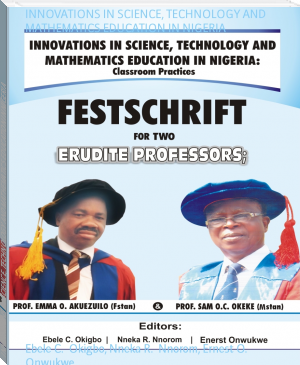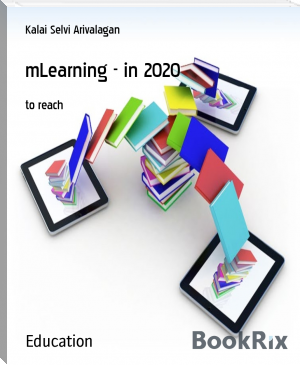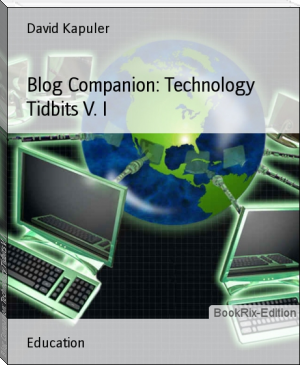INNOVATIONS IN SCIENCE, TECHNOLOGY AND MATHEMATICS EDUCATION IN NIGERIA - Ebele C. Okigbo, Nneka R. Nnorom, Ernest O. Onwukwe (best novel books to read TXT) 📗

- Author: Ebele C. Okigbo, Nneka R. Nnorom, Ernest O. Onwukwe
Book online «INNOVATIONS IN SCIENCE, TECHNOLOGY AND MATHEMATICS EDUCATION IN NIGERIA - Ebele C. Okigbo, Nneka R. Nnorom, Ernest O. Onwukwe (best novel books to read TXT) 📗». Author Ebele C. Okigbo, Nneka R. Nnorom, Ernest O. Onwukwe
Again, pupils see mathematics as difficult subject to study and teachers who treat the subject do not go into details of making the topics in mathematics simple. Teachers also do not have the patience to carry the slow learners along in the bid of trying to catch up or finish the scheme of work for the term. Ho and Hyun (2011), posits that lack of skills in understanding mathematical symbols, formulas, concepts and representations are challenges experienced by pupils in mastering mathematics subject. In support of the above, Gomez-Charon cited in Machaba (2013) posits that the emergence of negative attitudes and behaviours towards mathematics are the factor that contribute to the failure in mathematics. When pupils have negative perception towards mathematics such as perceiving mathematics as being too difficult and very confusing to learn, they will quickly lose their interests and motivation to learn the subject. As a result, they cannot perform well in solving mathematics problems.
Mathematics has remained one of the least successful subjects in Nigerian schools despite its importance. Many pupils have the notion that mathematics is difficult to learn and not many school children have interest in the subject right from primary school. Majority of pupils and many adults too believe that mathematics competence is for selected few. Okafor and Anaduaka (2013) are of the view that a whole lot of difference in the teaching and learning of mathematics can however be made by the mathematics teacher. A committed teacher of mathematics can surely turn around the sad story of mathematics learning in schools for the better. The authors’ further state that a mathematics teacher must acquire during training a good knowledge of the subject matter since no one can give what he/she does not have. Also, a mathematics teacher must build their learners confidence, have good sense of humour, encourage discussion and diversification of learning experience.
More teachers need to be trained and enough time be given for the teaching of mathematics in primary schools. This is to enable even the slow learners to learn mathematics. According to Idowu (2011), better recruitment and possibility of better selection of teachers is important. Also, better substantive education in teacher training institutions, on the job training of younger teachers by more experienced ones and in-service and long vocation courses to continue the education of teachers are some of the strategies to tackle the challenges. Margolinas, Coulanga and Bessot cited in Machaba (2013) argue that a teacher’s knowledge is a very significant topic for mathematics education. Shulman cited in Machaba (2013) concurs and further identifies content knowledge, pedagogical knowledge and pedagogical content knowledge as components of the professional knowledge of teachers. This implies that the teacher should not only possess academic knowledge, but should also be able to impact it in an understandable manner. It is vital that the vehicle of the teacher’s thoughts and knowledge should be clear and vivid to the child.
It is expected that mathematics teacher make use of adequate instructional resources that will stimulate and arouse pupils interest in mathematics learning as well as facilitate their understanding of mathematics topics. Most mathematics teacher teaches by mere talking without exposing the learners to the concrete materials that enhances learning. Okafor and Anaduaka (2013) are of the view that a creative teacher needs to know what materials are available or can be provided to enrich the teaching and learning of mathematical concepts.
Mathematics is the bedrock of science and technological development as such; adequate physical facilities cannot be over emphasized. The physical facilities in terms of infrastructure, equipment and materials will help the pupils grasp and acquire the necessary knowledge required of them. Solarin in Adolphus (2011) noted that schools lack facilities and equipment for teaching and learning of mathematics.
Improvement on the method of teaching will enhance effective teaching and learning of mathematics in primary schools. Okafor and Anaduaka (2013) are of the view that a successful mathematics teacher must use several methods in one lesson. Various methodologies used in mathematics teaching includes; play-way, project, demonstration, discovery, guided inquiry, problem solving, laboratory, cooperative learning strategy, individualize instruction, team teaching, target task approach, computer assisted instruction and multiple intelligences teaching approach.
It is also important to teach primary school pupils by having a pre-planned action that is (set induction) by the teacher which arouses the interest of the learners before the main lesson proper. For pupils to understand mathematics properly, mathematics teachers need to teach the subject by relating its content to pupils lives. The real life situations will help the learners to see mathematics as a means to solving their everyday life problems. According to Adolphus (2011), the strategies to enhance better teaching and learning of mathematics in schools includes; the teacher should arouse the interest of the learners while introducing the topic, use of instructional material to make the materials real, relate to real life situation, conducive learning environment, and necessary facilities in schools to facilitate teaching and learning. Others include; appropriate method, carrying all learners along with respect to individual difference, make the learners do more practical work than theoretical, class size should be such that the teacher can manage and teachers should monitor the activities and performance of their learners.
Osafemnti in Adolphus (2011) contends that curriculum changes in mathematics have occurred in several countries for one reason or the other, but more importantly because of the desire to improve school mathematics teaching to meet the ever changing needs of society, school and technology. Osanfemnti outlined the following problems with curriculum changes in Nigeria to include; failure of the mathematics to relate to the child’s environment and thus the child cannot see the importance and immediate application of mathematics in his day to day living. Each new curriculum has always taken the teachers unaware because they have never been involved in the development of the curriculum. Also, the Nigerian educational system has been constituted in such a way that teachers training, curriculum development and classroom practice are three separate activities. Therefore, curriculum changes have taken place without due consideration for the training of teachers who will use them both at the pre-service and in-service operational and training levels. And, non-availability of instructional materials such as textbooks, workbooks, slides, film stripes, among others to meet the pedagogical demands of the new curriculum imposed on teachers.
Statement of the Problem
The teaching and learning of mathematics have not been without problems in Igbo-Eze North Local Government Area of Enugu State. This has become a thing of concern to mathematics educators, parents and government. For some time now, there has been a growing concern over the poor teaching and learning of mathematics which resultant effect has been poor and failing standard in primary school pupils’ performance in mathematics. This could be as a result of poor method of teaching the subject by the teachers, teachers not showing enough motivation to arouse pupils interest, not relating lessons to real life situations, lack of facilities and instructional materials and the curriculum with an overcrowded syllabus among others. On the part of the pupils is lack of interest, having phobia for mathematics, having the perception that mathematics is difficult among others. All these prompted the researchers to identify the problems militating against the effective teaching and learning of mathematics in primary schools in Igbo-Eze North Local Government Area of Enugu State.
Purpose of the Study
The purpose of the study was to determine the problems militating against the effective teaching and learning of mathematics in primary schools. Specifically, the study intends to:
Determine the factors affecting the teaching and learning of mathematics in primary schools.
Determine the possible solutions to the problems encountered in the teaching and learning of mathematics in primary schools.
Research Questions
The following research questions guided the study:
What are the factors affecting the effective teaching and learning of mathematics in primary schools?
What are the possible solutions to the problems encountered in the teaching and learning of mathematics in primary schools?
Method
The study adopted the descriptive survey design to determine the problems militating against the effective teaching and learning of mathematics in primary schools. The area of the study was Igbo-Eze North Local Government Area of Enugu State. Two research questions guided the study. The population consisted of all the 835 teachers and 40 head teachers in the 40 public primary schools spread across the autonomous communities giving the total population of 875. Simple random sampling technique was used to select a sample of 120 teachers and 20 head teachers giving the total sample of 140 respondents from the 20 public primary schools which was also selected through simple random sampling techniques. Data were collected using a 29-item questionnaire developed by the researchers and titled: “Problems Encountered in Teaching Mathematics (PETM) Questionnaire”. The instrument was face validated by two experts in Childhood Education and one in Measurement and Evaluation Department of Educational Foundations all from Faculty of Education, University of Nigeria, Nsukka. The reliability of the instrument was determined using Cronbach Alpha Formula. A reliability of 0.78 was obtained for the entire instrument.
A four-point rating scale of Strongly Agree (SA), Agree (A), Disagree (D) and Strongly Disagree (SD) weighed 4, 3, 2 and 1 was used to answer the research questions. Mean and standard deviation were used to analyze the research questions. Mean response of 2.50 and above were regarded as agreed while those below 2.50 were regarded as disagreed.
Results
Research Question 1: What are the factors affecting the teaching and learning of mathematics in primary schools?
Table 1: Respondents’ Mean and standard deviation rating on the factors affecting the effective teaching and learning of mathematics in primary schools.
S/N Factors affecting the teaching and learning of mathematics x SD Decision
Government not paying attention to what is happening in the schools
0.73 Agree
Child’s home environment 3.30 0.74 Agree
Pupils not grounded in mathematics 3.44 0.68 Agree
Large class size 3.45 0.62 Agree
Parent’s academic background 3.17 0.82 Agree
Poor knowledge of instructional materials 3.19 0.86 Agree
by the teacher
Unavailability of teaching resources 2.75 0.90 Agree
Lack of interest by the pupils 3.06 0.78 Agree
Not using motivational approach by 2.63 0.85 Agree
the teachers
Lack of infrastructural facilities 3.16 0.79 Agree
Parents not paying attention to pupils
academy 3.21 0.81 Agree
Pupils having phobia for mathematics 3.34 0.74 Agree
Inadequate mathematics teacher in terms 3.43 0.77 Agree
of number and quality
There are no incentives to motivate the 3.26 0.91 Agree
teachers to put in their best
Not relating mathematics lesson to real 3.14 0.81 Agree
life situation
Paying more attention to fast learners
neglecting the slow learners 2.90 0.60 Agree
Negative attitude towards mathematics 3.18 0.88 Agree
Cluster Mean 3.16 0.78 Agree
Data in Table 1 show the mean and standard deviation scores on the factors affecting the effective teaching and learning of mathematics in primary schools. The respondents agreed that all the items listed in table 1 are the factors affecting the effective teaching and learning of mathematics in primary schools. This is confirmed with the cluster mean of 3.16 with the standard deviation of 0.78.
Research Question 2: What are the possible solutions to the problems encountered in the teaching and learning of mathematics in primary schools?
Table 2: Respondents’ Mean and standard deviation ratings on the possible solutions to the problems encountered in the teaching and learning of mathematics in primary schools
S/N Possible solutions to the problems x̅ SD Decision
Government support through providing 2.84 0.88 Agree
free textbooks for





Comments (0)